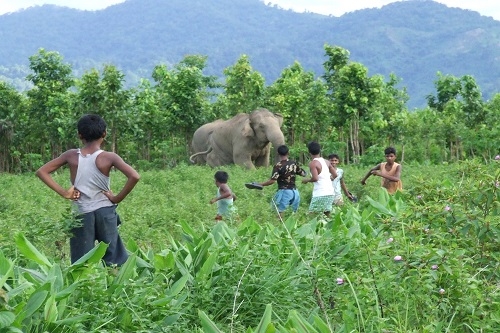Parliamentary panel for ‘legislative backing’ to manage man-animal conflict effectively
| Date :16-May-2022 |

Staff Reporter
In its report submitted to Rajya Sabha and Lok Sabha both, the Department-related Parliamentary Standing Committee on Science and Technology, Environment, Forests and Climate Change has recommended ‘legislative backing’ to manage man-animal conflict effectively. The recommendation is significant especially for Vidarbha region, considering that it has emerged as the hotspot of man-animal conflict.
The committee has made the recommendation in its report on The Wildlife (Protection) Amendment Bill, 2021. During the Budget Session in March 2022, in reply to an unstarred question in Lok Sabha, data regarding human death caused by tiger was cited. As per that data, in 2018, out of total 31 such human deaths in the country, the highest 15 were in West Bengal and two were reported from Maharashtra. However, in 2019, of total 50 such human deaths in the country, the highest 26 were in Maharashtra. The next year, in 2020, of total 44 deaths in the country, again the highest 25 were reported in Maharashtra.
As has been reported in media, the trend continued even in 2021. As per media reports, total 52 human deaths in tiger attacks were reported in Maharashtra. Though data is yet to be compiled for the year 2022 so far, the trend has continued. Most of the human deaths in tiger as well as leopard attacks in Maharashtra have been reported from Vidarbha region. Against this backdrop, the recommendation of the Parliamentary panel is all the more important for especially Vidarbha region.
The panel has observed that The Wildlife (Protection) Amendment Bill, 2021 ‘does not contain any specific provisions’ to deal with the concerns raised by the members of the committee on the issue of human-animal conflict. Having stated this, the committee has made some suggestions, with a hope that these will be considered seriously by the Ministry of Environment, Forests, and Climate Change before the Bill is brought back to Parliament. Treating human-animal conflict as a ‘complex issue as serious as hunting’, the committee has recommended ‘legislative backing’ in order to effectively managing the situation.
Also, the panel has recommended that the State Governments should constitute human-animal conflict (HAC) management advisory committees for dealing with such cases. It has observed that the HAC requires to be ‘disaggregated’ into the conflicts that endanger human life and property, and those that damage human property (crop damage). The advisory committee shall be headed by Chief Wildlife Warden, and senior police officer not below the rank of an Inspector General in charge of Law & Order as its Vice-Chairperson.
A specialised committee having limited members with in-depth technical knowledge ‘for evolving effective site-specific plans/mitigation strategies’
including recommendations on changing crop patterns and for taking critical decisions at short notice, ‘empowered under the law’ is necessary, it has suggested.
The comittee should have experts with specialised knowledge in terms of technical issues like chemical immobilisation and specialised capture techniques, translocation, identification of corridors for long-term resolution etc.
In order to deal with law and order situations arising in most HAC situations, the Parliamentary panel has recommended a senior police officer to be empowered under the law so that appropriate orders to Superintendents of Police can be issued to effectively control law and order and ensure protection to Forest Department staff and property.
The Wildlife (Protection) Amendment Bill, 2021 was introduced in Parliament in December 2021 by the Ministry of Environment, Forest and Climate Change. It was later referred to the Department-related Parliamentary Standing Committee.